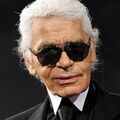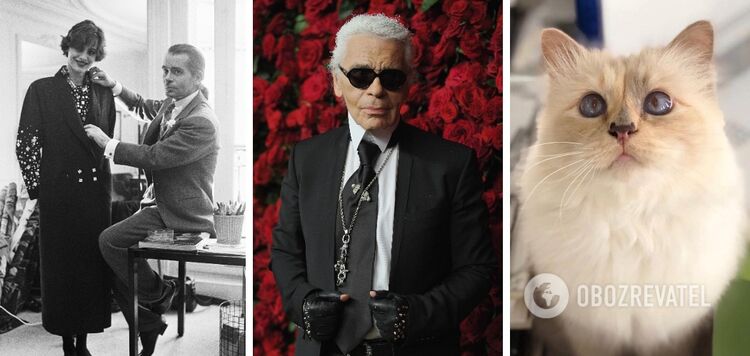
Karl Lagerfeld
A whole procession, led by a gray-haired gentleman in an excellent black suit, big dark glasses and a fan in his hand, came out of the building where one of Chanel's collections was being shown. He was followed by a mighty body of guards and some lesser retinue, all in dark suits and white shirts. They walked quickly enough, but not frantically, leaving a mystical substance in the air - a faint trace of coldness and aloofness. Well, of course, it's so obvious: he's definitely a hoaxer - this gray-haired gentleman. Have any of you seen his eyes? Has he spoken to anyone about the innermost things? Has he let anyone into his "temple of creation": his own, not the one where he imitates the style of the Grande Madame, calling it "the resurrection of her spirit"? There are more questions than answers in this man.
Karl Lagerfeld was born in Hamburg on September 10, 1938 in a fairly wealthy, prosperous family of a German bank employee. Business acumen and entrepreneurial spirit of his father, who once earned a fortune on the supply of canned milk in Europe, allowed the boy to get an excellent education. Carl perfectly mastered three foreign languages - English, Italian and French. He reread almost the entire parental library. But one classical upbringing was not enough: as Lagerfeld himself recalls, a huge role in the formation of his "I" played his mother - a pure-blooded aristocrat, well versed in perfumery and fashion. And since Frau Lagerfeld literally idolized her son, she sought to instill in him elegant taste and manners. It can be said that the future profession of Karl also chose her. One day, fed up with his playing the piano, his mother noisily slammed the lid of the instrument and said: "You should take up drawing - that, at least, doesn't make so much noise."
At the age of fourteen, realizing that for further growth he needs a new, more relaxed atmosphere than at home, Carl with parental blessing goes to Paris and ... finds himself captivated by this free and liberated city - the birthplace of high fashion and exquisite perfumes. Here Carl with the zeal of a diligent schoolboy continued his studies. But one day, taking his eyes off the boring textbooks and notes, suddenly decided to create "something".
When this "something" got to the contest of fashion sketches, in the jury of which sat Christian Dior, Pierre Balmain and Hubert Givenchy, Karl Lagerfeld was 16 years old. So ended the correct, measured life of a German student and began a new - bohemian, crazy, but most importantly - adult ...
Soon after a successful debut at a prestigious competition of sketches Carl invited to work himself Pierre Balman. For three years he worked in his studio, developing sketches, improving his skills and in parallel studying how the small cogs that make up the huge mechanism of fashion work.
In 1958 Lagerfeld was invited to the House of Jean Patou, where he stayed for five years, creating two haute couture collections a year.
And in 1963 he made a risky "trick", which no one has decided to repeat so far - he started working with four fashion houses at once - Chloe, Krizia, Charles Laurdan and Fendi, creating absolutely different collections for each of them.
Here, perhaps, the great talent of Karl Lagerfeld was most clearly revealed: he perfectly "faked the handwriting" of the famous houses, without "breaking" the old work of the fathers-creators, while adding his own zest to their styles.
The last and the most important in Lagerfeld's career was the contract with the House of Chanel. After the death of the legendary Coco in 1971, the chair of the chief stylist of the House was orphaned and empty in the hope of "warming up" the spiritual and ideological heir of the Great Madame. But, as a sin, several designers, alternately trying to take over the House, turned out to be talented individualists. The owners of the Chanel House needed a man who would preserve the uniqueness and uniqueness of style, and perhaps the spirit of Gabrielle Chanel herself. Karl Lagerfeld ingeniously recreated the spirit of Chanel, while adding a modern twist to the collections. The public swallowed this "cocktail" with delight.
In 1983, Lagerfeld was entrusted with the haute couture line, and in 1984 - with all areas of ready-to-wear. Karl Lagerfeld's inhuman efficiency was rewarded. His triumph was well-deserved.
Every year he creates an average of 2,500 sketches, that is, more than seven models every day. His working day lasts 20 hours.
What does he do all this time? Drawing, "composing" perfumes, photographing his ideas embodied in fabrics, reading. Yes, yes, he has three passions that he lets the public know about.
Perfume is his first passion, his "basic instinct". "For me, there is no greater pleasure than putting together a fragrance - note to note, creating certain combinations and thinking about how a certain accent might reflect on human feelings. I can't separate the creation of a fragrance from the development of a collection: both are parts of a whole."
His "personal archive" includes a fragrance for Chloe under the name Parfumes Lagerfeld, the perfume Photo, the men's perfume JAKO and KL, one of his most successful works.
Passion two is photography. Lagerfeld once said that he sees the world as if through the lens of a camera, and photo for him is a way of reflecting reality. He creates all the photographic advertisements for his new collections himself - he does not trust this intimate process to anyone else.
Books are Lagerfeld's third God. Wherever he is in the world, he always brings back a folio of his favorite author, including Balzac and Dostoevsky, or a book about art. So even some libraries would envy Lagerfeld's collection. By the way, in 2000, part of the collection of books on French art of the XVIII century, he sold at Christei's auction.
Whatever this fashion genius undertakes, he succeeds in everything. "The reason for my success is the ability to always move forward, ahead of the times. Creativity, work and personal life are one and the same for me. Every achievement of mine is the work of my hands and that's why I am happy," is his own opinion. I wonder if this is also a talented mystification of happiness? Well, no - it seems to be what it really is. It's just that sometimes people are born under a lucky star.
Chanel's clients are wealthy women. But even among them there is a kind of elite. For example, millionaire Mouna Ayoub buys her favorite collection without a trace.
She keeps these things in a house specially bought for this idea. But it looks like she's only storing them. The funny thing is that at fashion shows Muna appears in more than modest clothes - dark pants and a sweater. I wonder where she puts her Chanel outfits?
Jacqueline Kennedy once studied at the Sorbonne. So her return to Paris as America's First Lady was somewhat symbolic. The first thing Jacqueline did after her visit to the then President Charles de Gaulle was to meet Coco Chanel. Since then, Jacqueline has become a kind of advertising firm Chanel. Even on that fateful day for Kennedy in Dallas, Jacqueline was dressed in a pink Chanel suit with ruffles of blue silk and a pink hat.
Notes
- Already at the age of twelve, he knew firmly what he was going to do with his life. And he achieved almost everything he dreamed of.
- He doesn't smoke or drink: it must be hard for such a proper man in the Parisian bohemia.
- His hair is dazzling white. How do you achieve this effect? In the morning, his hair looks exactly like Beethoven's. He slicks it back, powders it, coats it with hairspray. One more layer of powder and then varnish again. Well, in general, approximately as they did in the XVIII century, but with more modern components.
- In public, always appears in dark glasses, because the eyes give away fatigue. Perhaps for someone with glasses and a fan he looks caricatured, but it does not embarrass him.
- To psychotherapists have never turned, perhaps because he once read a letter in which one of Freud's patients wrote to his friend: "Never use sessions of psychotherapy. It kills creativity." Believes that thinking only about pleasant things is the best therapy.
- Never regrets anything. Both in the case of success and failure. Creates delightful collections, but fame, power is of little interest.
- Memories of bygone youth are boring. He lives in the present and finds it magnificent.




